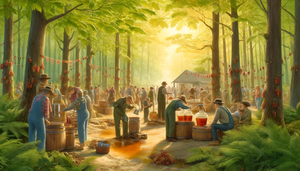Community Engagement in Climate Action: Supporting Sustainable Syrup Production
Jul 23, 2024
Maple syrup's rich, golden sweetness is a beloved addition to breakfast tables worldwide. But beyond its delightful flavor, maple syrup production offers a unique opportunity for local communities to engage in climate action and sustainability. By supporting sustainable syrup production, communities can help ensure the longevity of this treasured tradition while protecting the environment.
The Importance of Sustainable Syrup Production
Maple syrup production is inherently tied to the health of our environment. The process depends on the availability of healthy maple trees, which thrive in well-maintained forests. Climate change, however, poses a significant threat to these ecosystems. Rising temperatures and changing precipitation patterns can affect sap flow and tree health, putting the future of maple syrup at risk.
Sustainable syrup production practices are essential to combat these challenges. These practices include responsible forest management, minimizing carbon footprints, and supporting biodiversity. When communities come together to promote and implement these methods, they contribute to the broader fight against climate change and ensure that future generations can continue to enjoy pure, delicious maple syrup.
Ways Local Communities Can Engage in Climate Action
Engaging in climate action doesn’t have to be overwhelming. There are several practical steps that local communities can take to support sustainable syrup production and make a positive impact on the environment:
1. Support Local Syrup Producers
- Purchase syrup from local producers who prioritize sustainable practices.
- Attend farmers' markets and local food festivals to meet producers and learn about their methods.
- Encourage restaurants and retailers to source their maple syrup locally.
2. Participate in Community Programs
- Join local tree-planting initiatives to increase the number of maple trees.
- Volunteer for forest maintenance projects to help preserve natural habitats.
- Get involved in educational programs that teach sustainable syrup production techniques.
3. Advocate for Sustainable Policies
- Support policies that protect forests and promote sustainable agriculture.
- Engage with local government officials to advocate for environmental conservation.
- Participate in community meetings and forums to voice support for sustainability initiatives.
4. Practice Sustainable Living
- Reduce personal carbon footprints by adopting eco-friendly habits.
- Educate friends and family about the importance of sustainability in everyday life.
- Support broader environmental causes that align with sustainable syrup production.
Benefits of Community Engagement in Climate Action
When communities engage in climate action, the benefits extend beyond syrup production. Sustainable practices lead to healthier forests, cleaner air, more robust wildlife habitats, and increased biodiversity. Additionally, supporting local producers strengthens the local economy and fosters a sense of community pride.
Real-Life Success Stories
Communities across North America are already making strides in sustainable syrup production. For instance, in Vermont, many syrup producers have adopted practices such as using energy-efficient evaporators and implementing organic farming methods. These efforts not only reduce environmental impact but also enhance the quality and flavor of the syrup.
Cooperative initiatives among syrup producers have led to large-scale forest conservation projects in Quebec. By working together, these producers have protected vast tracts of forest land, ensuring the sustainability of syrup production for years to come.
FAQs
What is sustainable syrup production?
Sustainable syrup production involves practices that minimize environmental impact, such as responsible forest management and reducing carbon footprints.
How can I find local syrup producers who use sustainable methods?
Attend local farmers' markets food festivals, and check online directories of sustainable producers.
What are the environmental benefits of supporting sustainable syrup production?
Sustainable syrup production helps maintain healthy forests, contributing to cleaner air, biodiversity, and robust wildlife habitats.
How can I get involved in community climate action related to syrup production?
You can participate in tree-planting initiatives, volunteer for forest maintenance projects, support local policies and practice sustainable living.
Why is it important to engage with local government on environmental issues?
Engaging with local government helps advocate for policies that protect forests and promote sustainability, ensuring long-term environmental health.
By coming together and taking action, communities can play a crucial role in preserving the beloved tradition of maple syrup production while combating climate change. Sustainable syrup production is not just about enjoying a delicious treat; it's about creating a healthier, more sustainable future for everyone.


